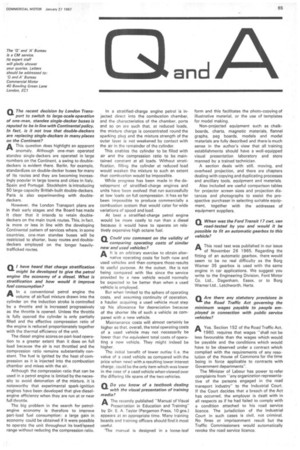Q I have heard that charge stratification
Page 67

If you've noticed an error in this article please click here to report it so we can fix it.
might be developed to give the petrol engine the economy of a diesel. What is stratification and how would it improve fuel consumption?
AIn a conventional petrol engine the
volume of air/fuel mixture drawn into the cylinder on the induction stroke is controlled by a throttle and is increased progressively as the throttle is opened. Unless the throttle is fully opened the cylinder is only partially filled and the effective compression ratio of the engine is reduced proportionately together with the thermal efficiency of the unit.
The diesel engine scores on part-load operation to a greater extent than it does on full load because the air is not throttled and the compression ratio remains substantially constant. The fuel is ignited by the heat of compression as it is injected into the combustion chamber and mixes with the air.
Although the compression ratio that can be used in a petrol engine is limited by the necessity to avoid detonation of the mixture, it is noteworthy that experimental spark-ignition engines have been developed that give dieselengine efficiency when they are run at or near full throttle.
The big problem in the search for petrolengine economy is therefore to improve part-load fuel consumption: a large gain in economy could be obtained if it were possible to operate the unit throughout its load/speed range without reducing the compression ratio. In a stratified-charge engine petrol is injected direct into the combustion chamber, and the characteristics of the chamber, ports and so on are such that, at reduced loads, the mixture charge is concentrated round the sparking plug and the mixture strength of the outer layer is not weakened by contact with the air in the remainder of the cylinder.
This enables the cylinder to be filled with air and the compression ratio to be maintained constant at all loads. Without stratification, filling the cylinder at reduced load would weaken the mixture to such an extent that combustion would be impossible.
While progress has been made in the development of stratified-charge engines and units have been evolved that run successfully at low loads on full compression, it has so far been impossible to produce commercially a combustion system that would cater for wide variations of speed and load.
At best a stratified-charge petrol engine would be more costly to run than a diesel because it would have to operate on relatively expensive high octane fuel.












































































































